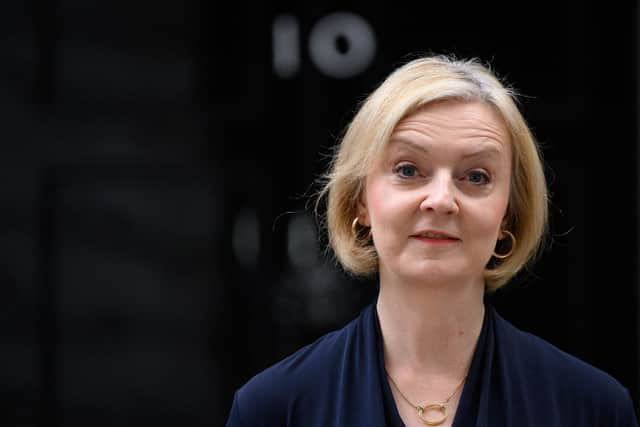Liz Truss resignation: Prime Minister resigns, leaving her party divided and its credibility in tatters
The Prime Minister stood down after just 44 days in office and a tenure that many Tory MPs feel has handed Labour the next election.
Just over 24 hours after insisting she was “a fighter, not a quitter”, Ms Truss stood at a lectern in Downing Street and said she had informed the King she was resigning as Tory leader.
Advertisement
Hide AdAdvertisement
Hide AdIt did not have to be like this, with her premiership falling on a hurdle she made herself on September 23, when the UK Government unveiled the mini-budget.


The plans contained an expansive energy support package, and one that went far beyond what Labour expected, offering real support to families who need it.
However, it also contained £45 billion of unfunded tax cuts, the bulk of which were for corporations and the super-rich.
Forgetting the £75 billion house the Institute of Fiscal Studies said it would leave in the public purse, the optics were horrendous.
Her MPs were suddenly forced to defend tax cuts for millionaires they couldn’t justify, with no financial forecasts from the OBR allowed.
To many, it seemed a budget of ideology rather than economical sense, and without paperwork to explain there was no way to justify it.
That her former Chancellor Kwasi Kwarteng attended a champagne reception with bankers directly after only made matters worse.
While lauded by pundits with an investment in Ms Truss’s success, the bulk of think-tanks and economic experts claimed it was a disaster.
Advertisement
Hide AdAdvertisement
Hide AdThe pound collapsed, the markets turned against her, and the Bank of England had to make an emergency intervention.
For a party that prides itself on being trusted on the economy, it was a total disaster.
Regardless of the reality, MPs and the public hated it, prompting the Prime Minister to record the lowest approval rating of any party leader ever in polling by YouGov.
Then there was her party management, with Ms Truss throwing Mr Kwarteng under the bus for the mini-budget, despite him being one of her oldest friends.
Having briefed the budget was decided by the two of them and them alone, there were no other ministers to blame, no officials to scapegoat.
This was a premiership built on Ms Truss’s vision, and as a result she and those around her are the ones who must pay for it.
Sacking Mr Kwarteng and abandoning her plans eased concerns in the market, but it left her authority utterly diminished.
MPs who once thought she was a strong and principled leader thought her weak.
Advertisement
Hide AdAdvertisement
Hide AdThen there was Wednesday, which saw a Downing Street adviser suspended for allegedly briefing former Cabinet member Sajid Javid was "s**t", the Prime Minister U-turned on pensions, the Government essentially called a vote of confidence in itself, U-turned on that, the chief whips resigned, then they U-turned on that.
At the start of the day, a Tory MP had told me they thought things could change. By nightfall, they sent a gif of a house on fire.
The big problems facing Britain remain, and Ms Truss only widened those divisions.
She may have gone, but the country is still watching as the Tory party fights itself yet again over its latest reset.
Comments
Want to join the conversation? Please or to comment on this article.
